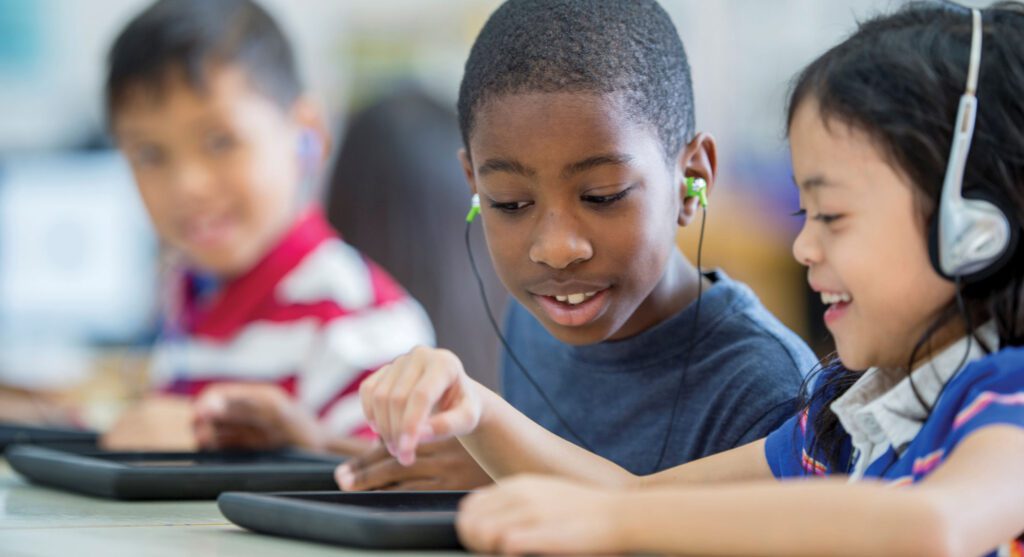I love research and am so happy that instead of looking through paper index cards and bookshelves and climbing library stairs, students can find answers to much of their research needs in mere seconds. While it is thrilling to find so much so fast, as a teacher and a parent I am concerned about what students might be missing and how those answers are biased. How is this super quick information acquisition brought by Google and other search engines connected to learning and knowledge in the classroom? Educators need to address the danger of complacency (“I have all the answers you seek”), inaccuracy (“fake news”) and information overload.
Students should analyze and synthesize Googled information
Today, students do not need the skill of finding information because it is handed to them by online search engines such as Google. They need tools to be able to ask the right questions and then evaluate the quality of what they receive. In my classroom, most reports and research are presented to peers, requiring a verbal explanation of new information. The amount of information found is of less importance than the correct use of new vocabulary and demonstrating how the information relates to the subject at hand.
For example, in preparation to play a mock stock market game, I had students research and present companies that might prove to be good investments. This assignment required not only finding relevant information, but also analyzing and comparing results.
Good teaching emphasizes that using copy and paste without sources is at worst plagiarism and at best irresponsible. It is easy to grab text and a picture or graph, but what is more important is to be able to explain why this particular information was chosen and how opinions, so easily accessible, might also be related to the subject. Developing a working knowledge of a topic and using a broad breadth of sources beyond the first link suggested is one way to legitimize the relevance of the information links retrieved. A robust bibliography is always required with my assignments.

Ways to determine sources of Googled information are credible
Critical researchers ask, “Is the best answer always the first item on the list?” It is human to want the first answer to be the right one. We want instant answers from someone who has seen everything, is impartial and has our best interests at heart, according to Penn Engineering Instructor and creative thinker Elan Ullenodorff in his blog “Escaping the Algorithm.” We want the source to tell us, “I understand what it is you want to know and it is knowable. I have the answer that you seek.”
Regardless of the ranking in search results, sources of Googled information must be determined to be credible. Three questions to ask when combing through the results of a Google search to determine if the source is credible, according to Carl T. Bergstrom (author and science professor at University of Washington ), and Jevin D. West ( associate professor of Information Science at University of Washington) in their book The Art of Skepticism in a Data-Driven World are:
- Who said it?
- How do they know it? Do they have credible expertise?
- What do they have to gain? Could this .com or .org have a biased viewpoint or something to sell?
The first search engine results are not always the best
Google search engine uses a specific criteria to rank search results. According to Faraz Ahmed Rizwan in a LinkedIn article, “The Untold Truth of Google’s Algorithm: SEO Secrets They Don’t Want You to Know,” the criteria include:
- Content quality. Is the information informative, engaging and well written?
- Relevance, which comes from the correlation of terms used in the query and terms used in the answer.
- Geographic parameters to limit the information options.
- User experience. (Defined by loading speed, mobile friendly content and easy navigation).
As can be seen from this list, accuracy and reliability of information is not a priority in search engine algorithms. The first “hit” on a search is not necessarily the best answer or information. It is, however, likely to be generated by the organization or company that paid to optimize results. It is estimated that 25-90 percent of people click on the first item that comes up on search engines, according to Search Engine Journal. Thus, jockeying for this position is substantial.
Cognitive overload leads to poor knowledge retention
Because just about everything you would want to know about anything is at our fingertips on the internet, we live in an environment of information overload, or as the teacher in me prefers to call it, cognitive overload. Cognitive overload is when the amount of information exceeds the ability of an individual to process the information. Too much information slows down activation of the memory regions in our brains, according to Nicholas Carr, former editor of Harvard Business Review and author of several books about the use of the internet. As a result, “Internet searching is causing us to lose our ability to focus and concentrate,” Carr says. When there is too much information, content evaluation is much more challenging.
Sorting and quantifying information is an important skill for students to acquire. Research shows that when students brainstorm prior information before starting research, this significantly increases knowledge retention and the way students can use the information they find.
As thoughtful teachers, parents and student mentors, we need to know that the information we ask for may be biased and that we will often receive a lot of it, quickly. Deciding specifically what we want to know, asking focused questions about the sources of information, starting research with broad-based knowledge and looking at search engine results with skepticism will result in gathering more accurate information. The good news is that with thoughtful prework, a healthy dose of critical thinking and reasonable expectations, we can learn all about the world we live in.
Additional resources:
How Google Classroom Is Changing Teaching: Q&A With Researcher Carlo Perrotta
Fordham University: Fake News: Evaluating & Fact Checking
Common Sense Media: How to Spot Fake News (and Teach Kids to Be Media-Savvy)
Factcheck.org: How to Spot Fake News
Dealing with information overload: a comprehensive review
Posted in: Education
Comment Policy: All viewpoints are welcome, but comments should remain relevant. Personal attacks, profanity, and aggressive behavior are not allowed. No spam, advertising, or promoting of products/services. Please, only use your real name and limit the amount of links submitted in your comment.
You Might Also Like...

What to Do When Your Child Cheats
Think back to third grade. It’s spelling-test day, and the word is “money.” Would that be “m-o-n-i-e”? Maybe, if you just peeked a bit over your friend’s shoulder and took […]

Copernicus Tutoring
Shasta High School Seniors Offer Free Tutoring For Peers Over the summer, Lily and Leah created a tutor application process, built a website, and recruited tutors for the Zoom-based program. […]

Tips From A Seasoned Homeschooler
My kids and I genuinely enjoy our time together. We might spend our days reading classic poetry, or poring over books about art before going to the gallery, or sitting […]

Choosing Afterschool Activities
The intense demands of schoolwork may cause you to hesitate when it comes to afterschool time. Although you don’t want to overload you child’s schedule, the academic, social and physical […]



